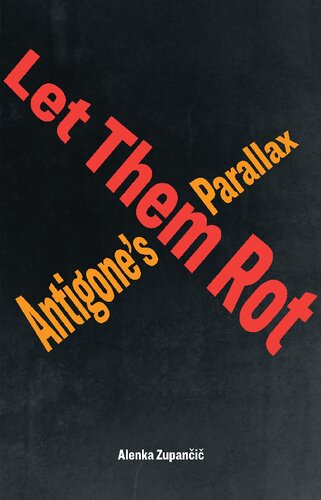

Most ebook files are in PDF format, so you can easily read them using various software such as Foxit Reader or directly on the Google Chrome browser.
Some ebook files are released by publishers in other formats such as .awz, .mobi, .epub, .fb2, etc. You may need to install specific software to read these formats on mobile/PC, such as Calibre.
Please read the tutorial at this link. https://ebooknice.com/page/post?id=faq
We offer FREE conversion to the popular formats you request; however, this may take some time. Therefore, right after payment, please email us, and we will try to provide the service as quickly as possible.
For some exceptional file formats or broken links (if any), please refrain from opening any disputes. Instead, email us first, and we will try to assist within a maximum of 6 hours.
EbookNice Team

Status:
Available4.7
17 reviews
ISBN-10 : 1531501044
ISBN-13 : 9781531501044
Author: Alenka Zupančič
A provocative, highly accessible journey to the heart of Sophocles’ Antigone elucidating why it keeps resurfacing as a central text of Western thought and Western culture. There is probably no classical text that has inspired more interpretation, critical attention, and creative response than Sophocles’ Antigone. The general perspective from which the book is written could be summarized with this simple question: What is it about the figure of Antigone that keeps haunting us? Why do all these readings and rewritings keep emerging? To what kind of always contemporary contradiction does the need, the urge to reread and reimagine Antigone—in all kinds of contexts and languages—correspond? As key anchor points of this general interrogation, three particular “obsessions” have driven the author’s thinking and writing about Antigone. First is the issue of violence. The violence in Antigone is the opposite of “graphic” as we have come to know it in movies and in the media; rather, it is sharp and piercing, it goes straight to the bone. It is the violence of language, the violence of principles, the violence of desire, the violence of subjectivity. Then there is the issue of funerary rites and their role in appeasing the specific “undeadness” that seems to be the other side of human life, its irreducible undercurrent that death alone cannot end and put to rest. This issue prompted the author to look at the relationship between language, sexuality, death, and “second death.” The third issue, which constitutes the focal point of the book, is Antigone’s statement that if it were her children or husband lying unburied out there, she would let them rot and not take it upon herself to defy the decree of the state. The author asks, how does this exclusivist, singularizing claim (she would do it only for Polyneices), which she uses to describe the “unwritten law” she follows, tally with Antigone’s universal appeal and compelling power? Attempting to answer this leads to the question of what this particular (Oedipal) family’s misfortune, of which Antigone chooses to be the guardian, shares with the general condition of humanity. Which in turn forces us to confront the seemingly self-evident question: “What is incest?” Let Them Rot is Alenka Zupančič’s absorbing and succinct guided tour of the philosophical and psychoanalytic issues arising from the Theban trilogy. Her original and surprising intervention into the broad and prominent field of study related to Sophocles’ Antigone illuminates the classical text’s ongoing relevance and invites a wide readership to become captivated by its themes.
1. Violence, Terror, and Unwritten Laws
2. Death, Undeadness, and Funeral Rites
3. “I’d Let Them Rot
let them rot antigone’s parallax pdf
let them rot antigone's parallax
let them rot
antigone's parallax
let them rot antigone’s parallax
Tags: Them Rot, Antigone, Parallax, Alenka Zupančič